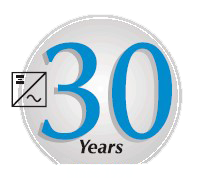Not all power inverters are equal. Some offer different levels of performance and capabilities than others. Even so, for prospective customers, there are some important considerations that apply in each case. The suggestions below can help you make an informed purchase and equip you with the knowledge you need to dialogue with sellers.
Define the Area of Application
Because the final application has a significant bearing on the model of inverter you choose, the first thing you need to know is why the inverter is being implemented. For example, if you want to convert solar power into usable energy off the grid, you need a solar inverter. However, if you plan to sell some of that power back to the utility provider, you need a grid tie inverter, too. Once you know the area of application, you can concentrate on finding a specific model of inverter.
Determine the Type of Current You Need
What type of Alternating Current (AC) does the equipment to which the inverter transmits electricity require: sinusoidal AC or nonsinusoidal AC? If it requires the former, you will need to invest in a pure (a.k.a. true) sine wave inverter. If the equipment can operate on the latter type of current, you may be able to get by with using a cheaper priced modified sine wave inverter or square wave inverter. Just remember that these models of inverters can cause harmonic distortion in equipment that requires sinusoidal AC, the kind of current that utility lines deliver.
Determine the Load Size
While you certainly don’t want to underinvest when it comes to load size, investing in too much load capacity can be costly, too. The goal is to choose a power inverter whose load size easily accommodates the load and still retains flexibility for foreseeable increases. If you need help determining the load size of the environment that the inverter will serve, a commercial electrical consultant can audit the environment and provide you with the numbers you need.
Consider Adverse Operating Conditions
Will the inverter be exposed to adverse conditions in the operating environment, such as unusual temperatures, heavy vibration, or airborne contaminants? If so, you may need to invest in a power inverter that has a Network Equipment-Building System (NEBS) certificate. A NEBS Level 3 certificate is given to inverters that withstand a variety of adverse operating without malfunctioning. If you need a product that has a specific type of NEBS certificate, installing one that doesn’t have the certificate is likely to make it experience operational problems.
Need Help Choosing an Inverter?
If so, the power inverter specialists at Exeltech are here to help. We have years of experience in designing ready made inverters for a variety of applications, as well as custom inverters that are created with a unique set of needs in mind. If this is your first time choosing an inverter, call us today at (800) 886-4683 to receive assistance with choosing the best equipment. You can also use the contact page on our website.




